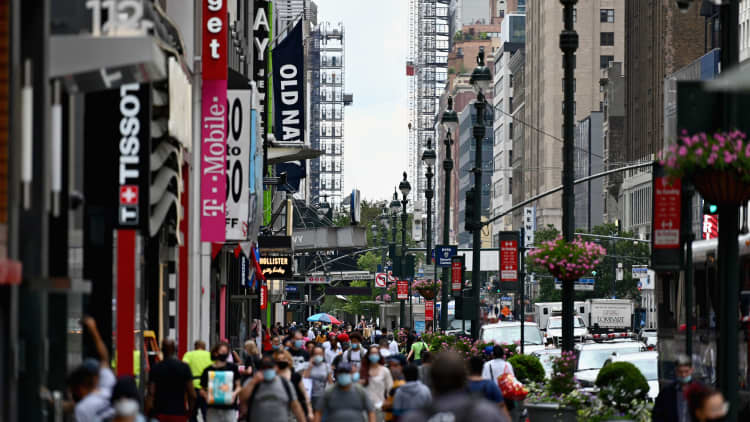
Stocks moved higher on a strong June jobs report, though concerns of a rising number of coronavirus cases in the U.S. lingered.
Here are five experts on what the jobs report says about the road to recovery.
Austan Goolsbee, former chairman of the Council of Economic Advisors, sees a stalemate on Capitol Hill.
"Normally in the months before a presidential election, both parties are trying to create a series of show votes where they say, "We were for this, and the other guys are against it." And they don't really want to reach compromises. And so the philosophy of the CARES Act was we don't have to decide who should get relief and rescue money, everybody gets money. … And now we're coming to the spot where you've got to choose: Is the money going to go to people? Is the money going to go to small business? Should the money go to big business? And to get a strong number like this, I think actually it's going to make the compromise decision a little harder, because there's going to be some people who say, "Well, if the economy is going to be strong, let's just wait a couple of months before we do anything." So I think there's a potential of a speed bump."
Kate Moore, head of thematic strategy for BlackRock's Global Allocation investment team, says companies need to adjust to the new normal.
"The market is pricing in more of a V-shape recovery. It's certainly pricing in a V-shape recovery in terms of earnings. The consensus is at about $163 [for S&P 500 earnings] for 2021, and we're trading at 19 times that at current levels. So I think what the analyst and investment community need right now is confirmation from companies as they report second-quarter earnings, which are going to be abysmal, confirmation that they've modified their business models and they are thinking about an existing Covid, not a post-Covid, world."
Nada Eissa, former deputy assistant secretary of the Treasury for economic policy, sees an uneven recovery for the job market.
"I don't think the numbers are meaningless, but I do think that we're not thinking about the fact that we have this resurgence in the virus, and the resurgence has two elements. One is the unforced errors by officials who basically opened without following the guidelines and have had now to pull back. But we've also seen a resurgence in places that did do the hard things so restaurants were set to open for diners in New York City. That's now on hold. And so I think that, looking forward, I don't know that we're going to be able to see the same types of job growth or continued job growth. I think it's going to be very jagged."
Jan Hatzius, chief economist at Goldman Sachs, digs into the numbers.
"If you look at the payroll numbers, obviously a large upside surprise. The household survey was an even bigger upside surprise in terms of the decline in the unemployment rate, especially when you adjust for misclassification. If you look at the Labor Department release, they're basically saying that the unemployment rate adjusted for misclassification came down from 16.4% or so to 12.1% or so. That's a 4 percentage point decline in the true unemployment rate, and a very large gain. Now, the claims numbers have been softer in recent weeks, for sure. And, that does deserve some weight, because this is a series that is long established, and is an administrative count, therefore quite high quality. … And it does tell you something about at least the layoff side. What the claims numbers don't tell you is the amount of rehiring. That's something that you really have to get from the monthly unemployment and payroll report."
David Rosenberg, founder of Rosenberg Research, says the job market still has a ways to go.
"It's still not clear to me as though today's job number in and of itself gives you a V-shaped recovery .... But we have to keep in mind the deep hole we're coming out of. I mean, there's no question that the jobs are coming back more quickly than anybody would have anticipated, including me just a few months ago. But we have to also recognize the fact that the economy was reopening ahead of schedule, so it would make sense that we start seeing some job creation coming back. But the hole is still so big in the context of losing 22 million jobs in two months so far. With all the reopenings that have happened and all the stimulus that's taken place, we've recouped a grand total of one third of that."





